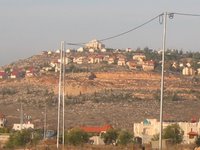As like most of you, I was shocked Thursday evening upon hearing what had occurred in Tel-aviv, another suicide bombing. Days away from our elections, something this bad was waiting to happen, only to make it harder for voting and proceeding with the campaigns.Please reread this passage from your last message.
Although I'd like to believe otherwise, the simple reading of your words is that the distressing aspect of the suicide bomber attack was the possible negative effects on the elections. This kind of apparent "insensitivity" creates the feeling that Arabs are heartless and cruel. What do you think? Was it a simple slip of the pen (as you are writing as a non-English speaker) or is there something deeper culturally as to which aspect of this tragedy is predominate in your mind?
Although in an earlier statement of 'checkpoints', I did not mean they shouldn't be enforced, rather I questioned why only we the Palestinians had the trouble of going through them, for every nation has the right to hold any sort of security run-throughs in order to ensure their own safety.I definitely agree with you. In fact many of the suicide-bombers succeeded in entering Israel in order to commit their vile acts by being transported in vans or taxi's sporting yellow (Israeli) licenses. I too agree that these vehicles should be checked, no less than non-Israeli vehicles.
I will mention though, that when you travel from Canada to the United States, there are separate lanes for non-Americans or non-Canadians when you enter each respective country, and separate lanes for citizens of each country. In short, this is not necessarily a discriminatory act.
My Shilo friend noted earlier abut the Tel here in Turmos-Ayya. Well, it consists of many old houses, dating back (written on stone blocks) to the early 1900's and of course earlier. ... Although very old and partially ruined, I still see and think of it as a beautiful part of our city which we can remember our past relatives and how they lived. In fact, my father and his fathers once live in these old stone houses, early in the 1950's. What's amazing is that till this day, many of these houses are lived in, and used by the 'poor' residents.I have a couple of questions for you ... straight forward, no tricks. A sincere attempt to try and understand what happened here in our valley over the past fifty years:
- When did Turmos Ayya start building outside the "Tel" area?
- When did you finally receive electricity and piped water?
- Where do you send your children to school?
- How many mosques are there in your village?
- Do you have an infirmary or health clinic in Turmos Ayya?
- When you go to larger urban centers to shop etc where do you go? Nabulus? Ramallah? Some place else?
Yoel Iben-Ibrahim
Shilo, Benyamin
 I won't pretend to get involved into the details of land claims and counter claims. I'm certain there are mistakes made and I am certain that to some extent the disputes are as much political as they are legal. None-the-less I must say that one of my favourite photographs of the Shilo Valley (Emek Shilo in Hebrew since Biblical Times
I won't pretend to get involved into the details of land claims and counter claims. I'm certain there are mistakes made and I am certain that to some extent the disputes are as much political as they are legal. None-the-less I must say that one of my favourite photographs of the Shilo Valley (Emek Shilo in Hebrew since Biblical Times 
